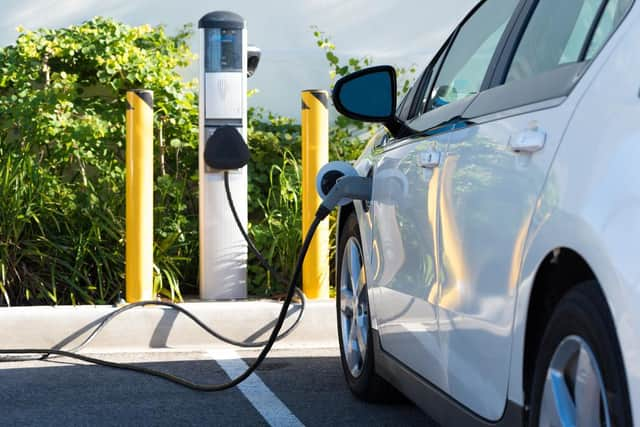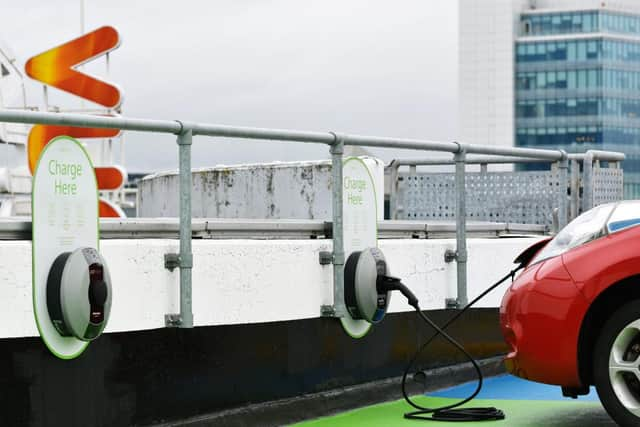How much does it cost to charge an electric car? Price, how long it takes, and where to find EV charging point
and live on Freeview channel 276
There is no doubt that the shift towards electric cars is accelerating in the UK.
Sales of EVs soared in 2020 compared with 2019, despite the difficulties faced by the industry, and 2021 has already seen major new model announcements, plans to upgrade infrastructure to support faster charging and some dire warnings about how the Government is placed to meet its 2030 ban on new petrol and diesel cars.
Advertisement
Hide AdAdvertisement
Hide AdWhile many drivers have already embraced EVs and a significant number are considering switching there are still common questions around their range and charging, including how long it takes, how much it costs and where you can charge an EV.


How many car charging points are there in the UK?
There are currently 30,000 public electric vehicle car charging points in the UK, but the government has announced it will increase this to 300,000 by 2030.
Some £500 million will be invested to install public chargepoints across the UK as part of the government’s new Electric Vehicle Infrastructure Strategy, it was announced on 25 March, 2022.
Support will be focused on helping drivers without access to off-street parking, as well as on fast charging for longer journeys.
How much does it cost to charge an EV?
The answer to this depends on a number of factors.
Advertisement
Hide AdAdvertisement
Hide AdThe first is the car itself. Different models have different battery capacities and in some cases the same car can come with a choice of battery capacity. The larger the battery, the more it will cost to charge but the further you’ll go on a single charge.
The second factor is where you plan to charge. In general, charging at home using a domestic wallbox is cheaper than using a public charger. The type of charger will also have an effect. If you’re using a public charging network then the faster the charger, the more you should expect to pay.
To calculate how much a particular car will cost to charge you multiply its capacity by the energy cost.
This is simple for home charging, as long as you know your energy tariff. For example, the best-selling Renault Zoe has a 52kWh battery. At the UK average of 14.4p per kWh it will cost you £7.48 for a full charge. A 64kWh vehicle such as the Nissan Leaf E+, Hyundai Kona or Kia e-Niro will cost £9.21 and a 100kWh Tesla Model S will cost £14.40.
Advertisement
Hide AdAdvertisement
Hide AdSome energy suppliers are now offering tailored EV packages with incentives such as lower off-peak rates for overnight charging.
Costs at public chargers are more complicated. Some charge per kWh, others charge by time and some include an initial connection fee. Slow 3kW chargers are the cheapest to use, with the highest costs found on the 50kW and above chargers. A 2020 investigation by What Car? found prices ranging from 9p per kWh to 40p per kWh, with connection fees from zero to £3.50. On top of that, some services charge a monthly subscription. In Scotland, ChargePlace Scotland offers unlimited free public charging at many of its stations for a flat £20 annual payment.


Complicating things further, some Tesla owners have unlimited free access to the brand’s exclusive Superchargers while others have to pay to use them, it all depends on the model and when it was purchased.
How long does it take to charge an EV?
Like the cost, the answer to this depends on a number of factors.
Advertisement
Hide AdAdvertisement
Hide AdThe two key influences are the size of the car’s battery and the charger’s output power.
Chargers range from 3kW up to 350kW and the more powerful a charger, the quicker it will top up a car’s battery.
Ultra-rapid chargers which offer more than 100kW are still relatively rare, although their numbers are increasing. At a station capable of 100kW charging, a typical EV will charge to 80 per cent in as little as 20 minutes.
As you’d expect, larger batteries take longer to charge but on a more common 50kW rapid charger most current models will charge to 80 per cent in between 60 and 90 minutes.
Advertisement
Hide AdAdvertisement
Hide AdA 40kW Nissan Leaf will go from 20 to 80 per cent charge in around 60 minutes while the 62kW version will take 90. Hyundai says its 64kWh Kona Electric will take 75 minutes to go from zero to 80 per cent charge on a rapid charger and Renault claims the 52kWh Zoe will add the same charge in 100 minutes.
Below rapid chargers, “fast” chargers operate at between 7kW and 22kW. On public networks these are useful for a quick top-up rather than a full charge, with an 80 per cent charge taking around two hours for a 40kWh battery on a 22kW unit.
Home wallboxes also generally offer 7kW charging, where an overnight charge will completely recharge most cars’ batteries. A full charge will take somewhere between seven and 12 hours on a 7kW charger, depending on battery size. For example, a 40kWh Leaf takes around seven and a half hours while the 62kWh model takes 11 and a half. The Zoe will take around eight hours, while the Kona will take nine and a half.
At the very bottom of the charger heap are 3kW slow chargers which, predictably, take about twice as long as a 7kW unit.
Where can I charge my EV?
Advertisement
Hide AdAdvertisement
Hide AdFor most EV buyers a home wallbox is the preferred charging solution. This allows them to plug the car in to charge at a time that is convenient for them. There is a grant scheme to help pay for a domestic charge point and some manufacturers will also help cover the cost.
However, when you’re out and about there are more than 30 networks offering public charging. According to Zap-Map there are currently more than 15,000 charger locations with a total of 41,200 connectors, ranging from 3kW to 350kW.
Common locations to find public chargers are at motorway service stations, retail parks and supermarkets, public car parks and park-and-ride facilities as well as leisure centres, hotels, visitor attractions and car dealerships. More and more retailers such as McDonalds and Costa are also partnering with charger firms to install rapid charge units at their outlets.
Dedicated EV service stations are also starting to appear. Gridserve’s Electric Forecourt in Essex is the first EV-specific site and Pivot Power has announced plans for a 38-charger location near Oxford. Both firms also plan to create dozens of similar sites around the UK in the coming years.
Advertisement
Hide AdAdvertisement
Hide AdDifferent locations will feature different networks’ chargers. In some cases this may mean you have to sign up to additional networks before being able to use the chargers. However, some networks are working together to offer a single payment service while others such as Instavolt all you to tap and pay with a credit card.